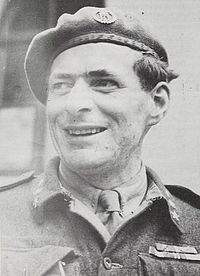
Back إريك جيمس أونستاد Arabic اريك جچيمس ونستاد ARZ Erik Gjems-Onstad Spanish Erik Gjems-Onstad NN Erik Gjems-Onstad NB Erik Gjems-Onstad Swedish
Erik-Ørn Gjems-Onstad (22 February 1922 – 18 November 2011) was a Norwegian resistance member, officer, lawyer, sports official, politician, author and anti-immigration activist.
Gjems-Onstad joined the Norwegian resistance movement after Nazi Germany invaded Norway in 1940. He was arrested in Sweden for his involvement with Norwegian resistance activity in the country in 1941, and was sent to the United Kingdom where he joined the Norwegian Independent Company 1 (Kompani Linge) and received British military training. He was deployed to Norway in 1943 as part of Lark, assigned with establishing radio connection with London. He led Lark in Trøndelag between 1943 and 1945, which constituted the leadership of Milorg in the region. His other activities included assisting with weapons smuggling, preparing for the sinking of the German battleship Tirpitz, and plotting to assassinate Nazi collaborator Ivar Grande. He also founded the Durham organisation for conducting psychological warfare towards the end of the war, and he took part in blowing up railway tracks. Gjems-Onstad's efforts during the Second World War led him to become one of Norway's highest decorated war heroes.
He joined the Norwegian Home Guard after the war, where he served as a captain. He completed his education in law, and also worked as a judge and lawyer. He ultimately reached the rank of colonel in the military, as military lawyer of the Royal Norwegian Air Force. For some years he was CEO of a project that planned to develop the Vaterland neighbourhood in Oslo. Gjems-Onstad also had a career in sports, representing the sports club SK Rye in cycling and racewalking. He later worked as a sports official, as a board member, and as chairman of various national sports bodies.
A former member of the Conservative Party and the libertarian organisation Libertas, Gjems-Onstad joined Anders Lange's Party when it was founded in 1973 and became the party's deputy leader. He was elected a Member of Parliament in the 1973 parliamentary election, and became the party's parliamentary leader following Anders Lange's death in 1974. Many of his views and proposals caused controversy, and he was in conflict with the new leadership of the party, which was eventually headed by Carl I. Hagen. Gjems-Onstad was expelled from the party in 1976, and finished his term as an independent. He also became known for criticising the Norwegian government's policy in Africa, and for defending the governments of countries such as Rhodesia and South Africa. In the 1980s he worked as an attorney for several anti-immigration activists, and from the late 1980s he became involved in anti-immigration politics himself. He stood in election for the Stop Immigration party in 1989 and for the Fatherland Party in 1991, and he was later involved in the People's Movement Against Immigration and Stop Islamisation of Norway.
